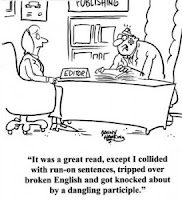Grammar Quiz
100 points
Fill in the blank (1 point/ space):
1. The “equation” for a sentence is
___________ + ______________ + ________________ .
2. A sentence must also begin with a
______________ _______________ and have
an ending _______________________ .
3. A ____________________ sentence is
two or more sentences improperly joined by wrong punctuation, no punctuation,
or some conjunction that needs help from some kind of punctuation.
4. Two main clauses can be joined with a
comma and a ______________ conjunction.
5. List the 8 parts of speech:
_____________________
_____________________
_____________________
_____________________
_____________________
_____________________
_____________________
_____________________
6. A _________________ is an action
word, state of being word, linking word, or group of words that is the action
or the link to the subject of the sentence.
7. When the subject performs the action
of the sentence, the verb is ___________________.
8. When the action of the sentence is
performed by the object, the verb is _______________.
9. Words or phrases that name a person,
place, or thing are called ____________________.
10. List the functions that a noun may
perform:
_____________________
_____________________
_____________________
_____________________
_____________________
11. A _______________ is a word used in place of a
noun. An _______________ is a word or
group of words to which a pronoun refers.
12. An _______________ is a word, phrase, or
clause that modifies (changes, limits, describes, transforms, qualifies) a noun
or pronoun.
13. Adjectives answer the following questions:
_____________________
_____________________
_____________________
14. An _______________ is a word, phrase,
or clause that modifies (changes, limits, describes, transforms, qualifies) a
verb, an adjective, or another adverb.
15. Adverbs answer the following
questions:
_____________________
_____________________
_____________________
_____________________
_____________________
_____________________
16. A word or words used to join other
words, phrases, or clauses is a ___________________ .
17. List the coordinating conjunctions:
_______________ _______________ _______________ _______________
_______________ _______________ _______________
18. _______________ means “time” and refers to the time shown by
the verb.
Give 2 examples for
each category of nouns
19. Common nouns:
20. Proper nouns:
21. Compound nouns:
22. Concrete nouns:
23. Abstract nouns:
24. Countable nouns:
25. Non-countable nouns:
In the following
sentences, fix the ones that are incorrect (3 points/ sentence)
26. Because F. Scott Fitzgerald had to
return the publisher’s advance for The
Great Gatsby.
27. Angie Park, strolling down Madison
Avenue, near the exclusive store where she used to shop.
28. While Brett served as a lookout and
Matt rifled the teacher’s desk looking for the answers to the test.
29. Steve Park built a house in Buffalo Bay before he built that house he had
lived in Queens.
Prepositional Phrases
In the following sentences, put
each of the prepositional phrases in parentheses and decide whether they are
adjective or adverb phrases. (13 phrases, total)
30. Behind the elm tree near the theater,
Jeremy discovered a purse filled with money.
31. Throughout her college career, Marcus
dazzled his professors with his accomplishments.
32. The cat chased the mouse under the
table before lunch while Mother was sitting in the sun by the back door.
33. Whenever I think about my writing
classes, I go into a frenzy of fear that I will never be able to write well for
my teacher.
Clauses
The following sentences
contain a variety of clauses. Surround
each clause in the sentences below with parentheses. (1 point/ sentence)
34. Whatever Lola wants, Lola gets.
35. Before he enlisted in the Marines,
Bill hunted wild boar in Australia.
36. Whenever Jill and Craig go on a long
trip, they each take a bag of books and a bag of snacks.
Verbs
Mark the following sentences
as A (Active) or P (Passive).
37. Julius Caesar was written by William
Shakespeare. ______
38. The case of the stolen car was
investigated by the police. ______
39. Julie warned her sister about being
sassy to their mother. ______
40. Kelly was encouraged by her friends
to go to college. ______
Indicate whether the
verbs in the following sentences are present, past, or future:
41. I see my neighbor every day. _____________
42. If you go to the park, you will see
the game. _____________
43. When I was a child, I saw Cinderella
in the theater. _____________
44. Jackie will drive his car to the
concert. _____________
45. I thought about the concert all day
long. _____________
46. The Olsons will sell their house
sometime next year. _____________








